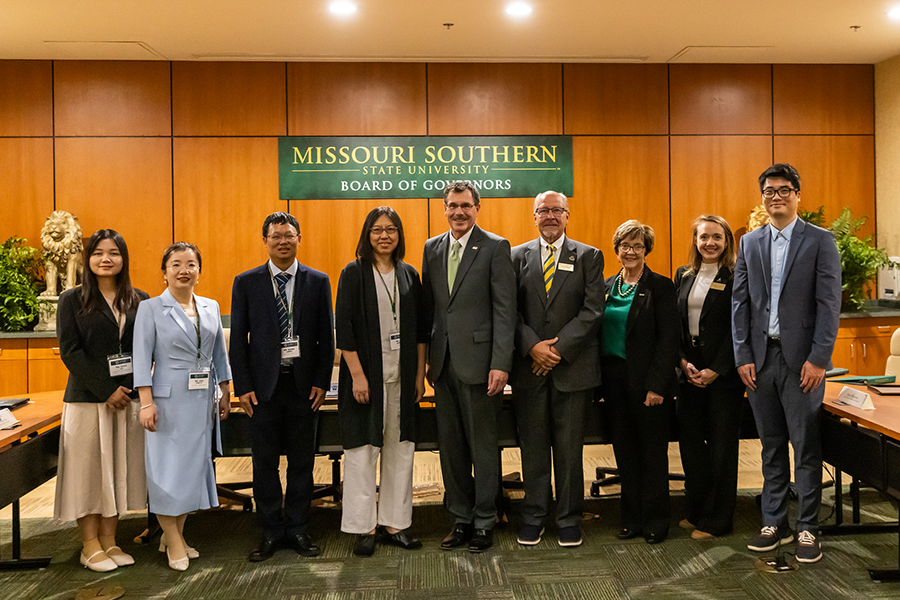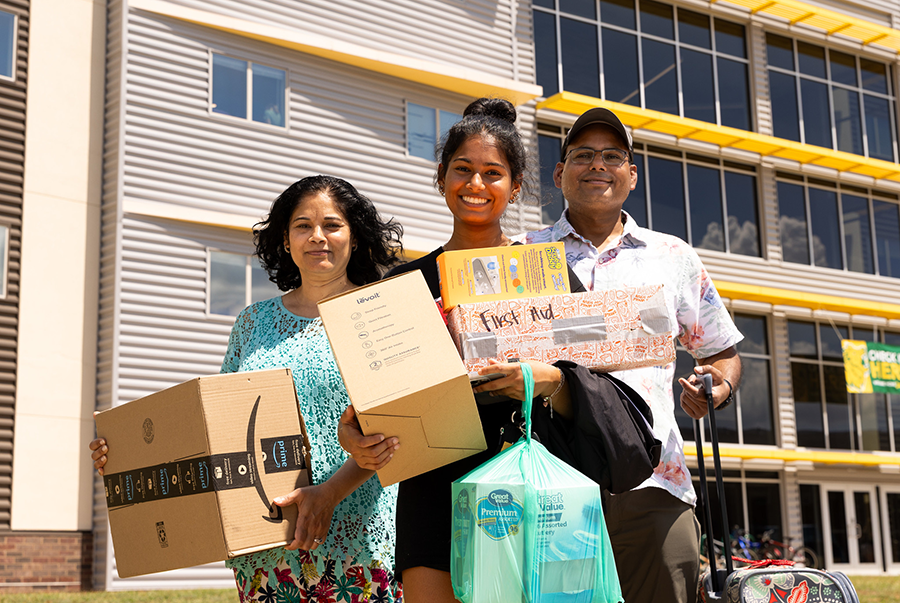In remembrance of those who dedicated their lives and service to those affected by the 9/11 tragedy, Missouri Southern State University would like to tell the story of Robert (Bob), ‘86, and Tresa Ryun Roth, ‘87.
Tresa and her twin sister commuted daily from Carthage to attend class at MSSU before work in the afternoon, often driving back to campus for evening Student Senate meetings, studying in the library, or to hang out with friends.
Tresa was quite active on campus, grading freshman papers for the English department, serving as a staff member for the yearbook, and teaching freshman orientation. She worked at Carthage’s Beimdiek Insurance in high school and while earning her education degree, even working on Representative T. Mark Elliot’s campaign since he also worked in the office. Tresa also babysat the daughters of MSSU Board of Regent member William (Bill) Putnam.
“Those were very busy but highly impactful years,” she said.
During her freshman year at MSSU, Tresa met her future husband Bob Roth through his best friend, Lew Poe, ‘86. Bob, a criminal justice graduate from Leesburg Va., always had an interest in national security and political affairs. While living in Joplin, Bob would often drive around town searching for newspaper stands selling “The Wall Street Journal” or “The Washington Post.”
“He was a prolific reader and always had books with him, particularly on historical events, political science, and Christianity,” said Tresa. “Bob was the only person my age I knew who had ‘Foreign Affairs’ delivered to his house and read ‘The London Times.’”
Bob was a summer employee at the CIA during his college years, and his interests led him to the University of Virginia where he earned an M.A. in International Affairs with an emphasis on U.S. and Soviet Studies.
Despite being introduced to each other during Tresa's freshman year, the two didn’t start dating until after Bob’s graduation. The night before her own graduation, Bob proposed.
“At commencement, Bill Putnam stepped forward to give me my diploma, and in my excitement, I declared, ‘Bill, look! I got engaged last night!’ I showed him my ring, and he had to remind me of my forgotten diploma.”
The Roths built their careers in Virginia. Bob worked for companies that supported FBI contracts for their Asset Forfeiture Unity. He later became an FBI special agent at the Washington Field Office, Northern Virginia offices, and the Headquarters.
Tresa worked as an insurance underwriter for three years before working at the CIA in Langley in the Directorate of Intelligence. She left the agency to homeschool her children and manage some properties on the side.
“September 11, 2001, started like any normal day,” Tresa began. “The weather outside was beautiful—the windows were open at home where I was with our three daughters, ages 2, 4, and 7, and I was very pregnant with our fourth child, our first son. Bob was in Quantico with many of his colleagues, requalifying on the gun ranges before they’d eventually go to their offices.”
Around 9 a.m. she received a panicked call from her best friend Lee Elliff-Pound, ‘86, checking on Tresa.
“I had no idea what was happening,” said Tresa. “nor how it would eventually impact our family.”
Tresa watched the news as the day unfolded while attempting to maintain a sense of normalcy at home. Meanwhile, Bob rushed to the Pentagon. As part of the FBI's Evidence Response Team, his team would be responsible for securing the area and collecting evidence while locating survivors and the black box from the plane.
“He did not come home until the next day but only long enough to shower, eat and nap,” Tresa said.
Bob worked at the Pentagon for two weeks—the Bureau had support teams from across the country rotating days and nights to guarantee consistent cleanup.
“Like the rest of the nation, we were all stunned by the events,” said Tresa. “but Bob and I both had a mindset that you persisted as a team for the good of the family and the country.”
In 2008, Bob passed from a 9/11-related illness—he was one of the first FBI responders to pass from an ailment related to the tragedy. He was officially declared a “Line of Duty Death” in 2016.
“I felt a bit isolated initially as a result,” Tresa said.
But Tresa used this to unite and serve others affected by the events. She advocated at collective meetings at Capitol Hill to secure benefits for 9/11 families, which resulted in the passing of the 9/11 Victim’s Compensation Fund bill. Her children also joined her at fundraising events for the FBIAA Memorial College Fund. Tresa soon attended the funerals of fallen Agents and introduced herself to their families, offering her phone number if they ever needed to talk about their circumstances.
“It is important to me that while terrorists may have taken away the lives of our loved ones, we stand together and strong, supporting one another. We can only do that if we leave our own comfort zones and call someone you don't know and offer comfort or advocate for benefits for strangers because you know that someday they'll need it. There is now a contingency of us, and we are known at Headquarters so that other Line of Duty families can contact us. It has been the greatest support group you never thought that you'd need.”
Currently, she facilitates a program called “Grief Share,” supports FBI Line-of-Duty Death (LODD) families and their fundraisers, helps with the Washington, D.C. Chapter of COPS (Concerns of Police Survivors), and is involved in a mentoring program for mothers of young children. Tresa has no plans to slow down her advocacy efforts.
“Initially, the cancers, respiratory problems and other odd illness diagnoses that first responders received were ignored, but the death toll kept rising,” she explained. “The death toll from the illnesses has now far exceeded the death toll from 9/11 and over 6,700 deaths were caused from the toxic dust and carcinogenic fumes. The National Institute for Occupational Safety and Health program closely tracks these illnesses, working in conjunction with the 9/11 Health Watch program to help those impacted.”
Aside from advocacy work, Tresa engages in real estate investment, enjoys her five children and the three sons-in-law who joined her family in the past few years, and is thriving in her newest role of "Nana."
“I have no plans to slow down as I know full well that life is short.”
Her proudest moment, though, was the day her youngest child graduated from high school.
“Bob and I had made the decision to homeschool the kids, but when he died, I was home with five children, ages 3 to 13. We would evaluate each child each year and do what was best for each one. We have done it all: homeschool, out-sourced classes, online courses, college-model private school, Classical Conversations, co-ops and public school. Seeing the last one graduate and join his siblings on the college route was like a retirement party for me and a huge relief. Raising them alone and financially re-grouping after leaving the workforce and supporting all of us was a huge accomplishment. We relied on our faith, and I think Bob would be very proud of each of us.”




